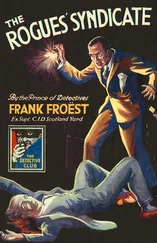'Dr Bauer! Not again. You promised to tell me how they work.'
'Certainly. You see, in my articles, I-'
'Dr Bauer, I've read your articles but I trained as a scientist and even I barely understood them. Popular science is supposed to be entertaining. You've got to write in a language that everyone can follow.'
Bauer looked hurt. 'My articles are easy to follow.'
'For you, maybe – and the two dozen others working in your field.'
'Now, that's not true. If you read the text carefully-'
'No, Dr Bauer, I want you to explain it.'
Bauer frowned, then smiled indulgently. 'If any of my students were to talk. . . But they wouldn't dare. They're not allowed to interrupt me – I leave that to myself. He raised his skinny shoulders in a shrug. 'But that's life, I suppose. I can't refuse you anything. I like you, Karen. You're a… Well. . . You remind me of. . . Oh, never mind. Let's take a look at this float.'
'And when we've done that, we'll talk about your findings. I'm getting enquiries.'
'Where from?'
'Magazines, TV programmes, institutes.'
'How interesting.'
'It's not interesting, it's normal – publicity's logical outcome. Do you even see the point of PR?'
Bauer grinned mischievously. 'Perhaps you'd like to explain it?'
'With pleasure – it'd only be the tenth time. But first, you're going to talk to me !
'But that won't do,' said Bauer, in agitation. 'We've got floats to lower, and then I mustn't forget to-'
'Keep your word and talk to me,' Weaver said sternly.
'But, Karen, my dear, you're not the only one getting enquiries. I'm writing to scientists all over the world. They ask the most outlandish things. One just emailed to ask about a worm. Imagine that – a worm! He even wanted to know if the methane concentration was higher than usual, which, of course, it is… But how was he to know? I'll have to-'
'I can deal with all that. I'll be your co-conspirator.'
'As soon as I've-'
'That's if you really like me.'
Bauer's eyes widened. 'I see. So that's how it is, is it?' His drooping shoulders shook with muffled laughter. 'That's exactly why I never married. It's constant blackmail. All right, then, I'll try harder, I promise. Now, let's get going. Come along!'
Weaver followed him. The drifting profiler was dangling from the boom above the grey surface of the water. It was several metres long and protected by a supporting frame. More than half of it was made up of a thin, shiny tube, with two spherical glass containers at the top.
Bauer rubbed his hands together. His down jacket was several sizes too big for him and made him look like an exotic Arctic bird. 'We drop the float into the water,' he said, 'and it bobs along with the current. Think of it as an enormous particle of water. There's a vertical drop beneath us – the water is sinking, as I said… Well, you can't see it sinking, of course, but it's sinking nonetheless. Now, how can I explain this?'
'Try avoiding jargon.'
Right. It's actually very simple. The point is, water doesn't always weigh the same. Warm fresh water is light. Salt water is usually heavier than fresh water. The saltier, the heavier, in fact – there's the added weight of the salt to consider. On the other hand, cold water is heavier than warm water because its density is higher. So water gets heavier as it cools.'
'Which means the heaviest water is always cold and salty,' Weaver put in.
'Very good.' Bauer seemed pleased with her. 'So, water doesn't just flow in currents: it moves up and down in layers. The coldest currents are on the seabed, warm currents are on the surface, and deep-water currents are somewhere in between. Of course, warm currents can travel thousands of kilometres on the surface before they reach colder regions where they start to cool down. And as the water cools-'
'It gets heavier.'
'Indeed. So, the water gets heavier, which makes it start to sink. Surface currents turn into deep-water currents, or even bottom-water currents, and the flow direction changes. It's exactly the same the other way round, but the water goes upwards, from cold to warm. That way, all the major currents are continuously in motion. And because they're all interconnected, there's a constant process of exchange.'
The float was lowered to the surface of the water. Bauer hurried to the railings and leaned over, gesturing impatiently for Weaver to follow. 'What are you waiting for? Come on, you'll get a better view from here.'
She stood next to him. Eyes glowing, Bauer was gazing out to sea. 'Imagine if there were floats in every single current!' he said. 'Just think how much we'd learn.'
'What are the glass spheres for?'
'They keep the float suspended in the current. There are weights at the other end too, but the key to the whole thing is the cylinder in the middle. All the equipment is in there. Electronic controls, microprocessor, power supply. And it's neutrally buoyant. Isn't that amazing? Neutrally buoyant!'
'I'd find it even more amazing if you told me what that meant.'
'Oh, yes. Of course…' Bauer tugged as his beard. 'Well, we had to think about how we could get the floats to- You see, it's like this: fluids are practically incompressible. That is to say, you can't compress them any further. Water is the key exception. You can't, er, squish it much, but it's possible. So that's what we do. We compress the water in the cylinder so there's always the same amount in there, but sometimes it's heavier and sometimes it's lighter. So the weight of the float can be varied without changing the volume.'
'Ingenious.'
'It certainly is! It can even be programmed to do it by itself – compressing, decompressing, compressing, decompressing, sinking down and rising up – without us lifting a finger. Clever, don't you think?'
Weaver watched the tube sink into the sea.
'It means the float can travel independently for months and even years, transmitting radio signals, while we track it and reconstruct the speed and the movement of the current. Off it goes.'
The drifting profiler had vanished.
'And where's it heading now?'
'That's the question.'
Weaver looked at him intently.
Bauer sighed resignedly. 'I know, I know. You want to hear about my work. Goodness me, you're tenacious… Very well, we can talk in the lab. But the findings are unsettling, to say the least.'
'People love to be unsettled. Haven't you heard? Jellyfish invasions, scientific anomalies, people going missing and sinking ships. You'll be in good company.'
'Do you think so?' Bauer shook his head. 'You're probably right. I'll never understand what publicity's about. I'm only a scientist.'
CONTINENTAL MARGIN, Norwegian Sea
'Shit,' Stone groaned. 'It's a blow-out.'
On board the Sonne , everyone in the control room stared at the screen. All hell seemed to have broken loose on the seabed.
Bohrmann spoke into the microphone: 'We've got to get out of here. Full speed ahead. Tell the bridge.'
Lund ran out of the room, and Johanson chased after her. Suddenly everyone on board was running. Johanson skidded on to the working deck, where sailors and technicians were shifting cold storage tanks under Lund's lead. The winch cable quivered as the Sonne accelerated.
Lund saw him and ran over.
'What was that?' he yelled.
'We hit a gas pocket. Look!'
She pulled him across to the railings. Hvistendahl, Stone and Bohrmann joined them. Two Statoil technicians had gone to the far end of the stern and were standing under the A-frame, peering down.
Bohrmann was gazing at the taut cable. 'What the hell is he playing at?' he hissed. 'Why hasn't the idiot stopped the winch?' He hurried back inside.
At that moment the sea started to bubble madly and white lumps shot to the surface. The Sonne had reached full speed. There was a clunking sound as the video-grab's cable tightened. Someone raced across the deck towards the A-frame, waving wildly. 'Get away from there!' he yelled to the pair from Statoil. 'Run!'
Читать дальше












